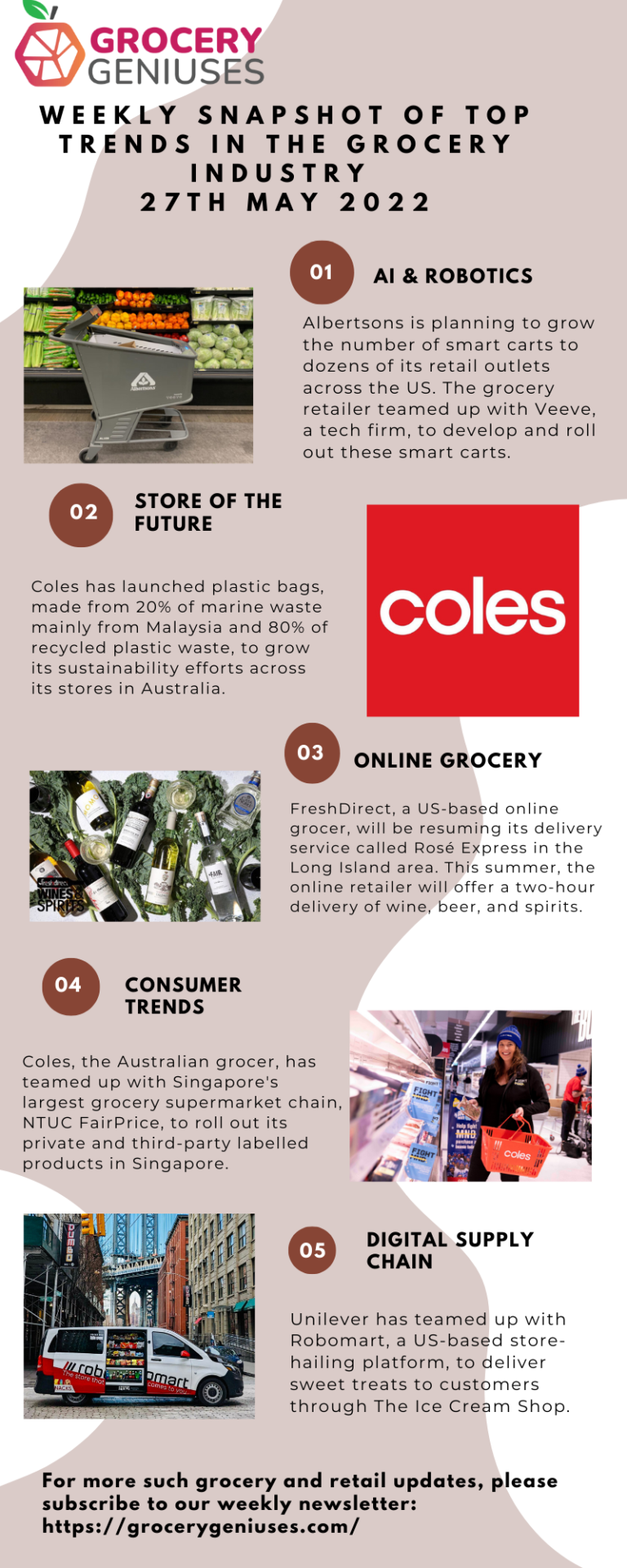
Weekly snapshot of top trends in the Grocery industry
This is the weekly snapshot of top grocery disruptions and trends in the Grocery industry (20th May-27th May)

This is the weekly snapshot of top grocery disruptions and trends in the Grocery industry (20th May-27th May)

Walmart is planning to expand its drone delivery to 4 million households in the US.
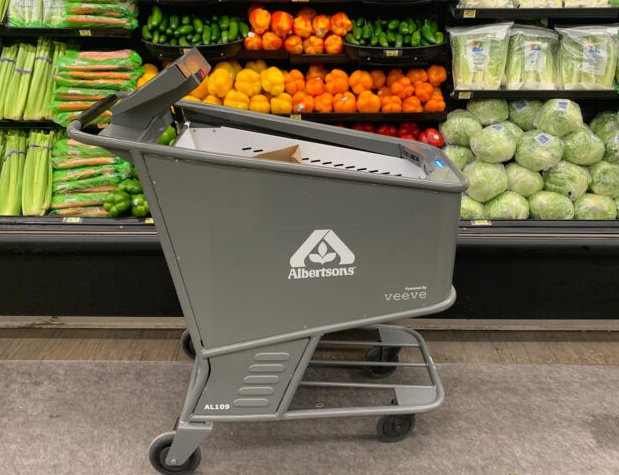
Albertsons is planning to grow the number of smart carts to dozens of its retail outlets across the US.

Atome, a Singapore-based fintech firm, is planning to enter South Korea by the end of this year.
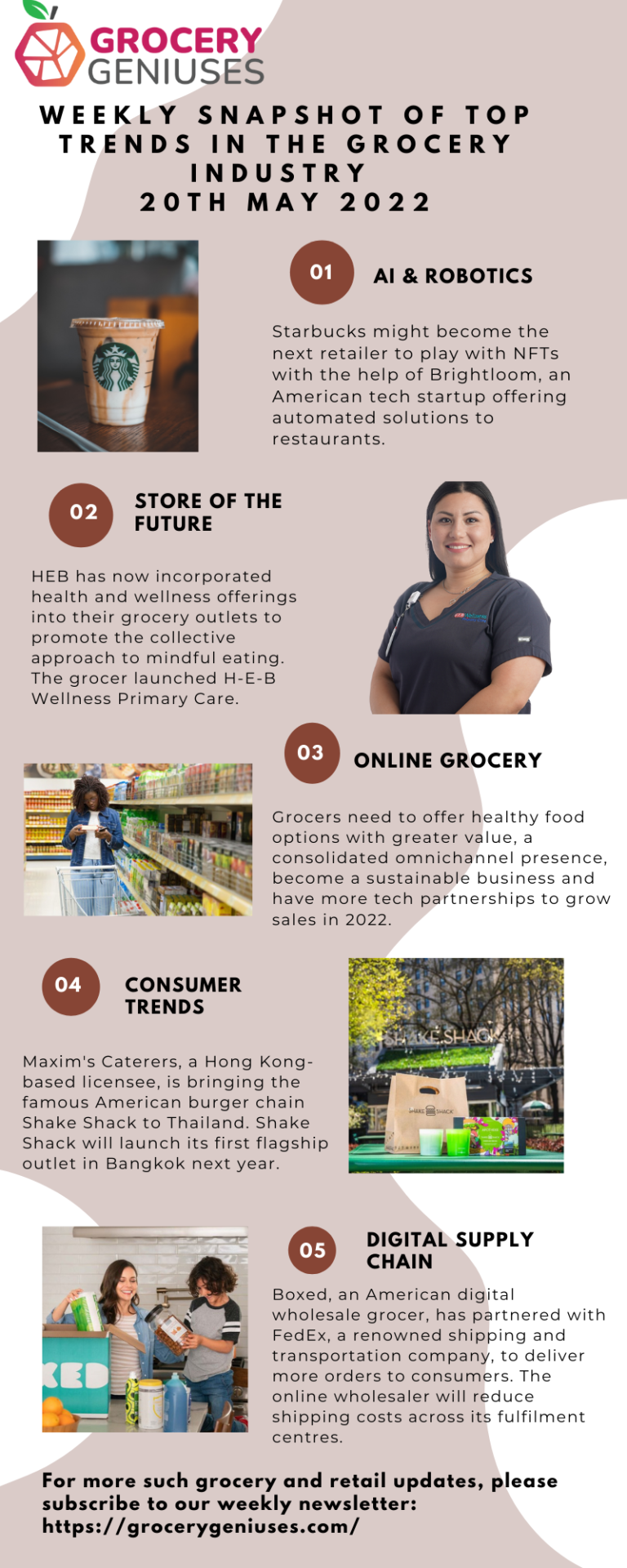
This is the weekly snapshot of top grocery disruptions and trends in the Grocery industry (15 May-20 May.)

Starbucks might become the next retailer to accept NFTs with the help of Brightloom, an American tech startup offering automated solutions to restaurants, as per some speculations.

These days, large tech firms are busy developing and splurging dollars on artificial general intelligence (AGI) to out-perform humans. Engineers are currently embedding massive datasets into uncomplicated algorithms to know how exactly the human brain functions. The AGI creature would be able to comprehend human behaviours and actions. It also understands human psychology to decipher their next moves. Humans might want to befriend them as they believe these AGI creatures are pretty harmless. Pew Research forecasted that few professionals think the tech industry will execute meaningful ethical AI practices by 2030. The industry professionals need to stop these creatures from manoeuvring the public by implementing these solutions: 1, The Human workforce has to be clued up while automating the procedures. 2, We have to take these tech creatures as our foes masking beneath a friendly veil. A sense of urgency needs to be created to bar this unethical tech invasion into human minds. To read more, visit VentureBeat

Uber Eats, a third-party delivery firm, is considering rolling out driverless delivery vehicles to deliver orders to customers. The delivery platform has partnered with Motional to roll out autonomous delivery vehicles in Santa Monica, California. Motional’s all-electric IONIQ 5 vehicles have been adapted to provide autonomous deliveries. The vehicle firm spent several months piloting the on-road autonomous vehicle (AV) programme in the Los Angeles area. The partner delivery firms will receive an update when the delivery vehicle will reach the customer’s location. Shoppers will receive a notification and use the Uber Eat app to unlock the vehicle door and collect their orders. To read more, visit ProgressiveGrocer
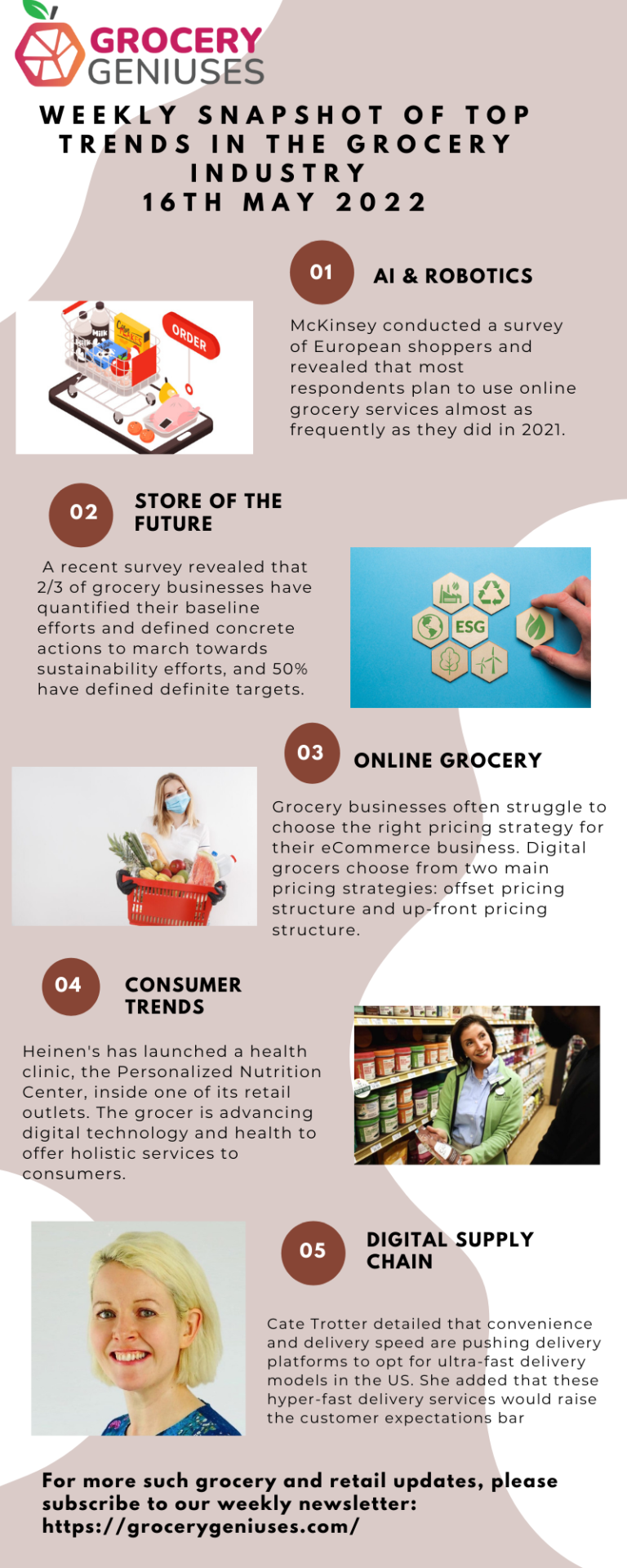
This is the weekly snapshot of top trends from the Grocery industry (22 April-29 April.) AI & Robotics: McKinsey conducted a survey of European shoppers and revealed that most respondents plan to use online grocery services almost as frequently as they did in 2021. Store of the Future: A recent survey revealed that 2/3 of grocery businesses have quantified their baseline efforts and defined concrete actions to march towards sustainability efforts, and 50% have defined definite targets. Online Grocery: Grocery businesses often struggle to choose the right pricing strategy for their eCommerce business. Digital grocers choose from two main pricing strategies: offset pricing structure and up-front pricing structure. Consumer Trends: Heinen’s has launched a health clinic, the Personalized Nutrition Center, inside one of its retail outlets. The grocer is advancing digital technology and health to offer holistic services to consumers. Digital Supply Chain: Cate Trotter detailed that convenience and delivery speed are pushing delivery platforms to opt for ultra-fast delivery models in the US. She added that these hyper-fast delivery services would raise the customer expectations bar.

Many ultra-fast delivery platforms continue diversifying their business models to generate various revenue streams and manage costs. Recently, Jokr, an ultra-fast delivery platform operating in the US, has launched Jokr Media. The delivery firm made this move to strengthen the firm’s profit margins and grow sales of CPG products. Jokr Media will allow business partners to grab more personalised and relevant product placements in its app. Jokr offers marketing and promotion services that include in-app banners, sponsorships, and sampling. The retail media platform is currently available in America and some parts of Latin America, including Colombia, Mexico, Peru, Chile, and Brazil. To read more, visit GroceryDive

As consumers increasingly shop and stay online, brands need to use marketing automation tools to utilise machine learning. Almost 80% of tech-savvy Google advertisers use automated ads to improve ad performance. Brands from the APAC region have started using Performance Max, the latest campaign that allows brands access to all of their Google Ads inventory. These three brands are using three strategies to improve ad performance: 1, Nespresso sales went up in Thailand during the pandemic. The brand became relevant by showing ads while consumers searched for ideas to enjoy coffee at home. 2, Unilever connected with high-value shoppers at scale as it wanted to generate leads via its Cleanipedia website in Vietnam. The retailer let consumers win vouchers after filling out an online form embedded in the ads. 3, MindValley, an education platform producing self-improvement videos, also adopted Performance Max in Malaysia. Performance Max created campaigns across channels and optimised them for performance. To read more, visit ThinkWithGoogle

Amazon One continues to give a technological makeover to Whole Foods Market. The tech giant aims to deepen the tech automation of the grocer’s retail outlets. Amazon revealed that it is rolling out the autonomous technology to its six additional locations in the coming weeks. The Amazon-owned grocer launched its new store in Austin’s Arbor Trails shopping centre. Other outlets are situated in the city’s Domain, East Austin, Lamar, Gateway, Bee Cave, and Cedar Park areas. After retail, Amazon wants to make it big in the grocery industry. To know more, please visit GroceryDive
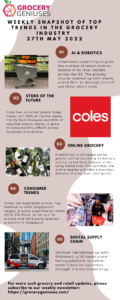
This is the weekly snapshot of top grocery disruptions and trends in the Grocery industry (20th May-27th May)

Walmart is planning to expand its drone delivery to 4 million households in the US.

Albertsons is planning to grow the number of smart carts to dozens of its retail outlets across the US.

Atome, a Singapore-based fintech firm, is planning to enter South Korea by the end of this year.
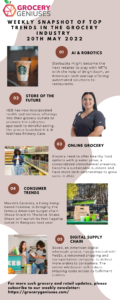
This is the weekly snapshot of top grocery disruptions and trends in the Grocery industry (15 May-20 May.)

Starbucks might become the next retailer to accept NFTs with the help of Brightloom, an American tech startup offering automated solutions to restaurants, as per some speculations.

These days, large tech firms are busy developing and splurging dollars on artificial general intelligence (AGI) to out-perform humans. Engineers are currently embedding massive datasets into uncomplicated algorithms to know how exactly the human brain functions. The AGI creature would be able to comprehend human behaviours and actions. It also understands human psychology to decipher their next moves. Humans might want to befriend them as they believe these AGI creatures are pretty harmless. Pew Research forecasted that few professionals think the tech industry will execute meaningful ethical AI practices by 2030. The industry professionals need to stop these creatures from manoeuvring the public by implementing these solutions: 1, The Human workforce has to be clued up while automating the procedures. 2, We have to take these tech creatures as our foes masking beneath a friendly veil. A sense of urgency needs to be created to bar this unethical tech invasion into human minds. To read more, visit VentureBeat

Uber Eats, a third-party delivery firm, is considering rolling out driverless delivery vehicles to deliver orders to customers. The delivery platform has partnered with Motional to roll out autonomous delivery vehicles in Santa Monica, California. Motional’s all-electric IONIQ 5 vehicles have been adapted to provide autonomous deliveries. The vehicle firm spent several months piloting the on-road autonomous vehicle (AV) programme in the Los Angeles area. The partner delivery firms will receive an update when the delivery vehicle will reach the customer’s location. Shoppers will receive a notification and use the Uber Eat app to unlock the vehicle door and collect their orders. To read more, visit ProgressiveGrocer
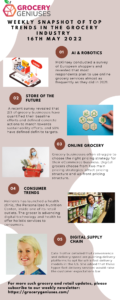
This is the weekly snapshot of top trends from the Grocery industry (22 April-29 April.) AI & Robotics: McKinsey conducted a survey of European shoppers and revealed that most respondents plan to use online grocery services almost as frequently as they did in 2021. Store of the Future: A recent survey revealed that 2/3 of grocery businesses have quantified their baseline efforts and defined concrete actions to march towards sustainability efforts, and 50% have defined definite targets. Online Grocery: Grocery businesses often struggle to choose the right pricing strategy for their eCommerce business. Digital grocers choose from two main pricing strategies: offset pricing structure and up-front pricing structure. Consumer Trends: Heinen’s has launched a health clinic, the Personalized Nutrition Center, inside one of its retail outlets. The grocer is advancing digital technology and health to offer holistic services to consumers. Digital Supply Chain: Cate Trotter detailed that convenience and delivery speed are pushing delivery platforms to opt for ultra-fast delivery models in the US. She added that these hyper-fast delivery services would raise the customer expectations bar.

Many ultra-fast delivery platforms continue diversifying their business models to generate various revenue streams and manage costs. Recently, Jokr, an ultra-fast delivery platform operating in the US, has launched Jokr Media. The delivery firm made this move to strengthen the firm’s profit margins and grow sales of CPG products. Jokr Media will allow business partners to grab more personalised and relevant product placements in its app. Jokr offers marketing and promotion services that include in-app banners, sponsorships, and sampling. The retail media platform is currently available in America and some parts of Latin America, including Colombia, Mexico, Peru, Chile, and Brazil. To read more, visit GroceryDive

As consumers increasingly shop and stay online, brands need to use marketing automation tools to utilise machine learning. Almost 80% of tech-savvy Google advertisers use automated ads to improve ad performance. Brands from the APAC region have started using Performance Max, the latest campaign that allows brands access to all of their Google Ads inventory. These three brands are using three strategies to improve ad performance: 1, Nespresso sales went up in Thailand during the pandemic. The brand became relevant by showing ads while consumers searched for ideas to enjoy coffee at home. 2, Unilever connected with high-value shoppers at scale as it wanted to generate leads via its Cleanipedia website in Vietnam. The retailer let consumers win vouchers after filling out an online form embedded in the ads. 3, MindValley, an education platform producing self-improvement videos, also adopted Performance Max in Malaysia. Performance Max created campaigns across channels and optimised them for performance. To read more, visit ThinkWithGoogle

Amazon One continues to give a technological makeover to Whole Foods Market. The tech giant aims to deepen the tech automation of the grocer’s retail outlets. Amazon revealed that it is rolling out the autonomous technology to its six additional locations in the coming weeks. The Amazon-owned grocer launched its new store in Austin’s Arbor Trails shopping centre. Other outlets are situated in the city’s Domain, East Austin, Lamar, Gateway, Bee Cave, and Cedar Park areas. After retail, Amazon wants to make it big in the grocery industry. To know more, please visit GroceryDive
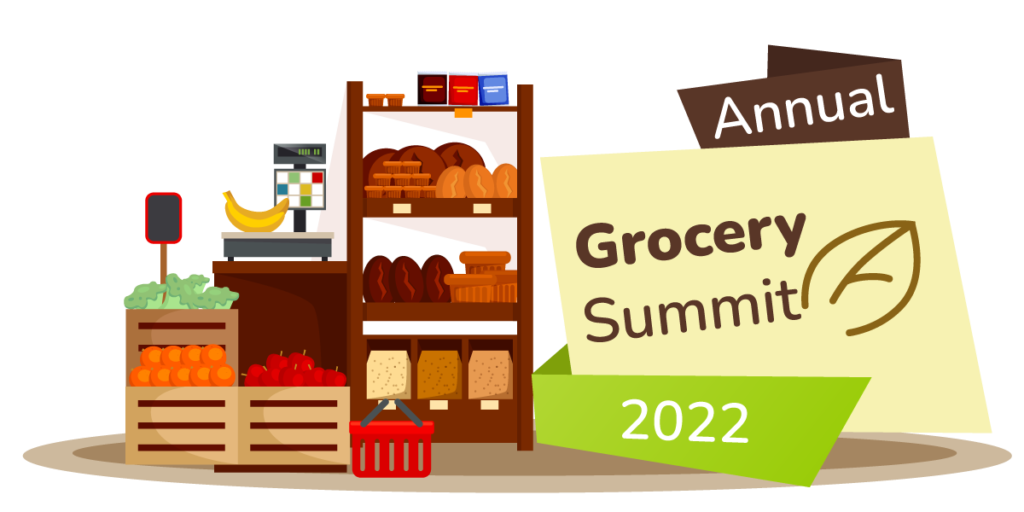
The global food and grocery retail industry is expected to surpass $17T by 2027, expanding at an annual rate of 5%. During this time, digitisation is set to transform the entire food value chain from farm to fork. Our weekly newsletter covers innovations and disruptions in food and grocery industry.
GroceryGeniuses is managed by IndustryGeniuses (A place where industries meet innovation). We are rolling out content platforms for the world’s hottest industries such as Food & Grocery Retail, Consumer Goods and Healthcare. For each of these key industries, we support industry leaders as they roll out next generation digital initiatives.
IndustryGeniuses team brings practical domain knowledge of working with 300+ tech startups and brands over the past decade.